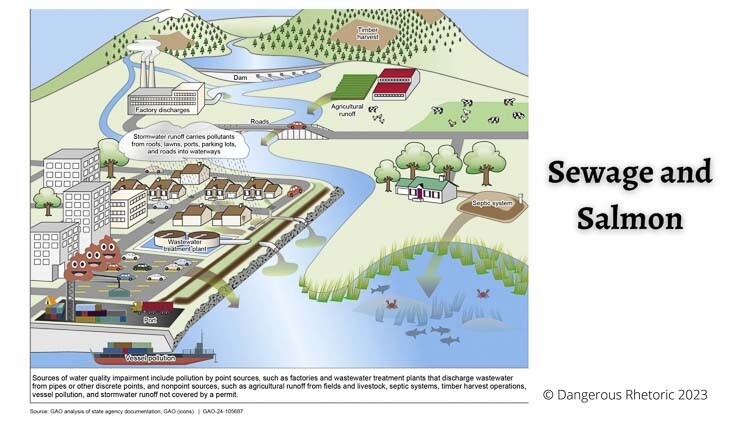
Nancy Churchill addresses a recent GAO report and what it exposes about what has happened to the salmon population
Nancy Churchill
Dangerous Rhetoric
On Nov. 9, Rep. Cathy McMorris Rogers’ office released a report with a rather sensational title: ”Government Accountability Office: Governor Inslee and Washington State Department of Ecology Responsible For Salmon Decline.” The topic of the press release was a recent GAO report with a more modest title: “Puget Sound, Further Actions Could Improve Efforts to Address Impaired Water Quality That Threatens Salmon.”

In the press release, Rodgers was joined by Representatives Dan Newhouse (WA-04) and Cliff Bentz (OR-02) in releasing the following statement: “It doesn’t require an advanced degree to understand that years of dumping raw sewage and pollution into the Puget Sound would decimate salmon populations. That simple fact is now indisputable with this GAO report, which exposes what we’ve known to be true all along: Governor Inslee and the Washington Department of Ecology are responsible for killing Puget Sound salmon and must be held accountable for their negligence.”
Knowing that the current president’s administration has a progressive bias, I became curious if the GAO report actually pointed so directly to Governor Inslee and the Department of Ecology. I also wanted to know if the dumping of raw sewage was prominently featured in the GAO report. I read the entire fifty-three page GAO report and here’s what I found.
Misdirection, minimizing and excuses
The GAO report includes some great educational information and helpful illustrations regarding the life cycle of salmon. The report also covered many possible variables that could impact the salmon’s ability to thrive in the current conditions in the Puget Sound. Unfortunately, the overall organization and focus of the report is a great example of the impact of bias and the misuse of government resources to promote a preferred narrative.
The GAO focused the most attention on the impact of variables that fit a climate crisis narrative: water temperature (from global warming), dissolved oxygen levels, non-point sources of sediment (like agriculture), and toxic chemicals from human activity (particularly tire dust). The GAO could not ignore the fact that the Washington Department of Ecology has failed for many years to meet the required deadlines to submit an impaired waters List to the EPA. The report subheading is clear: “EPA has overseen Ecology’s development of two impaired waters Lists Since 2012, but the agencies have faced challenges meeting required deadlines.” These evaluations are due every TWO years, yet the EPA has failed to take action against Ecology to bring about improved report delivery. Figure 6 on page 23 of the report documents the ongoing failure to deliver timely evaluations. It’s such a dismal and inadequate performance record, that I wonder if all the fuss about the Snake River Dams is just a smoke-and-mirrors distraction to divert attention away from Ecology’s ongoing failure to develop impaired waters lists as mandated by law.
Minimizing the real problem: raw sewage
Readers of the report have to wait until Footnote 56 on page 30 of the report to discover the elephant in the Puget Sound: point sources of raw sewage. A point source is a direct discharge source like a stormwater pipe, as opposed to non-point sources like runoff from agricultural land.
Sewer overflow systems “discharge untreated sewage mixed with stormwater to water bodies during heavy rain events. This occurs with certain old collection systems designed to overflow when rainfall or snowmelt exceeds the capacity of treatment facilities. For example, the city of Seattle is responsible for more than 80 combined sewer overflow outfalls, and King County is responsible for nearly 40 outfalls.” That’s about 120 sources of raw sewage that are potentially impacting Puget Sound salmon.
Seattle and King County are under consent decrees from 2013 to implement control measures by 2030, but both jurisdictions want to modify those decrees, presumably to extend the time. Why delay in taking steps to protect the salmon and Puget Sound resident orcas? Why the silence from environmentalists who claim to care about salmon and orcas?
Save the salmon with common sense solutions
There is always a limit to state public funds. This requires the leaders of state agencies to make wise choices regarding priorities. Ecology should stop trying to monitor ALL Washington state waters (a massive and obviously overwhelming task), and focus on Puget Sound waters and drainages which directly impact salmon and orca populations. Tackle the most obvious and easy to correct problem: Puget Sound population centers and the 120 faulty combined sewage overflow systems.
Enforce the existing laws, rather than seeking to expand the power and authority of Ecology over non-point sources, which is a minor problem with more challenging solutions compared to working to eliminate the introduction of raw sewage from Seattle and King County. If Ecology cannot successfully solve problems with its existing authority over point sources of pollution, why would we grant additional authority over other areas?
Finally, urban areas should strictly enforce laws to prevent street defecation, which is an additional source of raw sewage and toxic chemicals into stormwater drains. Ecology or the EPA could Impose massive fines on King County and the City of Seattle to encourage them to take quick action to fix the 120 sewer overflow systems. The Legislature could use the proceeds from the much hated carbon tax to save the salmon by funding the necessary improvements to the Overflow 120.
Nancy Churchill is the state committeewoman for the Ferry County Republican Party. She may be reached at DangerousRhetoric@pm.me. The opinions expressed in Dangerous Rhetoric are her own.
Also read:
- Opinion: Fort Vancouver Regional Libraries levy lid liftDick Rylander shares Q&A with FVRL leadership about the proposed levy lid lift, detailing budget needs, tax impacts, and what a YES or NO vote could mean for library services.
- Letter: ‘The public has allowed this to happen’Wynn Grcich calls on Vancouver residents to support Justin Forsman and Rob Anderson in local elections and urges more civic engagement to challenge current city leadership.
- Letter: ‘I am a law-abiding citizen, who believes in the free speech of others’Jim McConnell of Vancouver shares his frustration over repeated sign thefts opposing changes to McGillivray Boulevard and defends the right to free speech in Cascade Park.
- Opinion: Taxes and assessed valuesDick Rylander explains how property tax proposals are calculated and urges Clark County residents to understand assessed values before voting on new taxes.
- Opinion: Why has Vancouver hired a shelter provider with a record of failure?Amy Harris questions Vancouver’s decision to hire Do Good Multnomah, citing documented failures and urging city officials to explain their choice.










